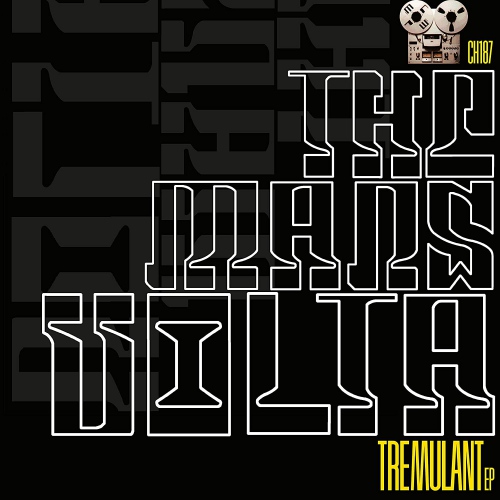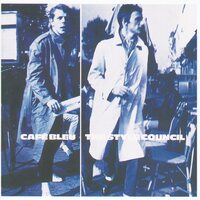Tremulant From the very beginning, The Mars Volta was conceived as more than simply a new vehicle for Omar Rodriguez-Lopez and Cedric Bixler-Zavala. The group was to be a rebirth, a redrawing of their creative frontiers, a repudiation of the stylistic provincialism that had ultimately spelled the end of their previous band, At The Drive-In, a year earlier. So, as The Mars Volta’s debut release, 2002’s Tremulant EP had much to accomplish within its three tracks and 19 minutes: to define the group’s ambitions and their possibilities, to sketch out a limitless horizon for their future adventures, and to shake loose the macho following they’d accrued with At The Drive-In’s final, breakthrough LP Relationship Of Command, the dudes in the moshpit who just wanted to slam-dance to post-hardcore riffs. Tremulant put this uncompromising ethos into play from the very off, first track Cut That City opening with two minutes of amplifier hum, synthesiser scree and drum-machine pulse. “That introduction was immediately going to weed out all the posers,†says Cedric. The music that followed, meanwhile, announced The Mars Volta’s visionary new sound, an embryonic version of everything that would follow. The fearless rhythms drew from the traditional Caribbean and Latin music Omar was raised on, its staccato guitar riffs accompanied by Ikey Owens’ infernal organ stabs, Eva Gardner’s canny bass-lines and Jeremy Michael Ward’s inventive sound manipulations, its frenetic, restless panic-rock given to exultant breakdowns, like Omar’s beloved salsa. Cedric, meanwhile, was stretching beyond the fiery bark he’d established with At The Drive-In, singing more than screaming, and singing often in Spanish. The centrepiece, Concertina, is more ballad than brawn, pushing Cedric and band beyond any hitherto identified comfort zones. “It was the first time I was really trying to sing,†Cedric remembers. “[Producer] Alex Newport would listen to me do a take, and just say, ‘No, do it again.’ There was no fudging it, like in punk-rock. I just had to try again and again, harder and harder, until I nailed it. But I remember hearing the final outcome, and being so excited by it.†Here was a group reinventing their musical lexicon in real-time, their grasp exceeding their considerable reach, their sound unlike anything else happening within the underground scene they would swiftly transcend. “To me, the EP was a combination of Throbbing Gristle, Mahavishnu Orchestra, King Crimson and Bjork,†says Cedric, though even this eclectic clutch of references hardly does justice to Tremulant’s genre-emulsifying sprawl, segueing from splenetic punk-salsa pell-mell to meditative, dubbed-out drum machine symphonies with unerring confidence. More than just a portrait of the band in its germinal state, Tremulant captured a Mars Volta that would never exist again, being their sole release with their original bassist. In addition to sculpting the group’s low-end, Eva – who’d studied ethnomusicology at UCLA – aided the untutored Omar as he grappled with the complexities of musical theory, and helped the group synthesise one of their guiding influences, the incendiary Afrobeat of Fela Kuti. “The EP is a promise of what could have been,†says Omar, noting that Eunuch Provocateur and Cut That City possess a groove unique within the group’s discography, “because Eva was so deep in the pocket.†By the time Tremulant was released – on their own label, at their own expense, part of an ongoing effort on Omar’s part to prove what they could achieve under their own steam – Gardner was gone, and The Mars Volta were about to undergo another crucial metamorphosis. And while, in context of everything that followed, the Tremulant EP might seem like a dry run, a prologue, a pre-echo of what’s to come, it remains an adventurous, confounding and brilliant release in its own right, signalling that The
Install our app to receive notifications when new upcoming releases are added.

Recommended equipment and accessories
-

Edifier R1280DB Powered Speakers
Combining classic design with modern Bluetooth connectivity, built-in amplification and versatile inputs, these speakers deliver rich, balanced sound.
-

Technics SL-1500C Turntable
Features a direct-drive motor, a high-precision tonearm, and a premium MM cartridge, delivering exceptional sound quality
-

Pro-Ject Debut Carbon EVO
Featuring a one-piece carbon fiber tonearm, precision-tuned motor, and a heavy steel platter with TPE damping, it ensures superior stability and sound quality.
-

Nagaoka MP-110H Cartridge
Features a high-quality elliptical stylus that provides excellent tracking and minimizes distortion, delivering a detailed sound reproduction with an output voltage of 5.0 mV
-

HumminGuru: Ultrasonic Vinyl Record Cleaner
Advanced ultrasonic technology with customizable cleaning cycles and a large tank capacity to thoroughly remove dust, dirt, and contaminants
Featured Upcoming Vinyl
-

Hercules & Love Affair Someone Else Is Calling
Stratasonic
January 30, 2026 -

Style Council Cafe Bleu [3xLP]
Polydor
January 30, 2026 -

Karnivool In Verses [2xLP]
Century Media Int'l
February 13, 2026 -

Mya Fear Of Flying [2xLP]
Verve Label Group
February 13, 2026 -

Gong Bright Spirit
Kscope
March 13, 2026 -

Softcult When A Flower Doesn't Grow
Easy Life Records Ltd
January 30, 2026 -

Massive Wagons Live at the Great Hall
Earache Records
March 27, 2026 -

Hen Ogledd DISCOMBOBULATED
Domino Record Co
February 20, 2026 -

Robin Trower One Moment in Time (Live In The USA) [2xLP]
Provogue
January 30, 2026 -

Embrace Avalanche (Dark Blue Smoke)
Cooking Vinyl
June 12, 2026 -

Denzel Curry & The Scythe Strictly 4 The Scythe (Transparent Violet)
Loma Vista Recordings
March 6, 2026 -

Avalon Emerson Written Into Changes (Red)
Dead Oceans
March 20, 2026 -

Isabel Pine Fables
Kranky
February 20, 2026 -

Congratulations Join Hands (Random Blue, Red, Green, Yellow)
Bella Union UK
February 20, 2026


















